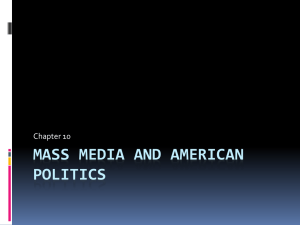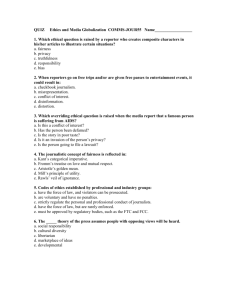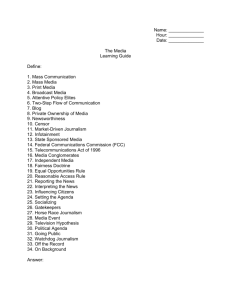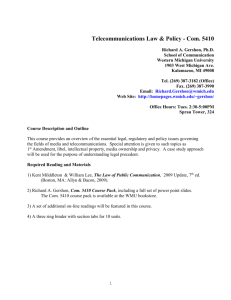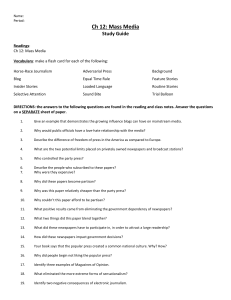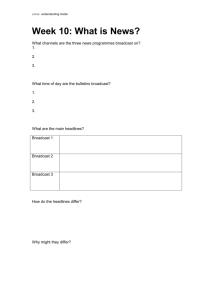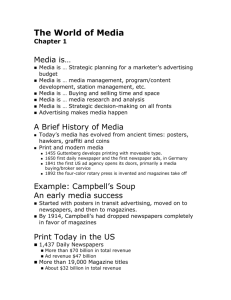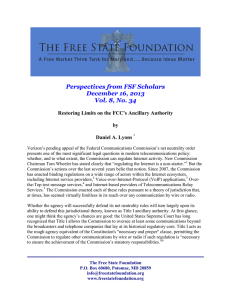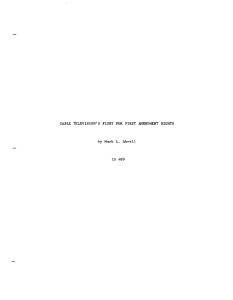Media
advertisement
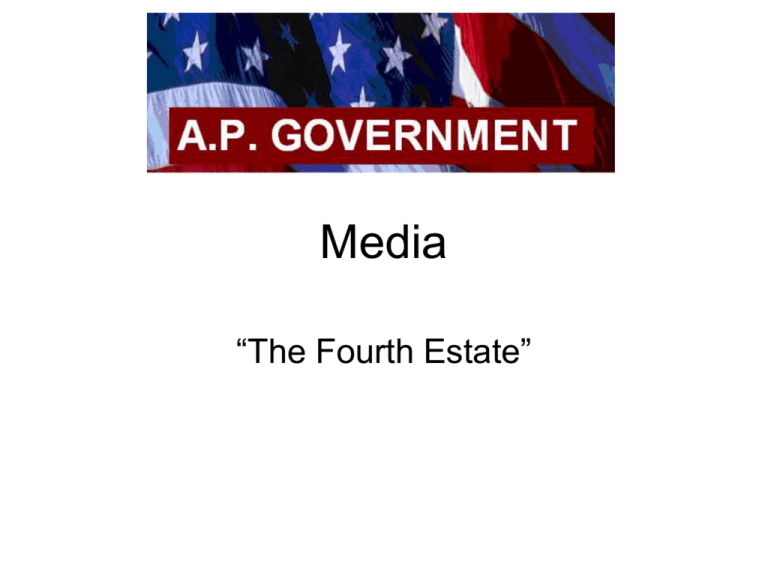
Media “The Fourth Estate” Key Terms • A medium is a means of communication. • Media is the plural of medium. • The mass media are means of communication that can reach large, widely dispersed audiences. • Examples?? Functions of the Media • Entertainment – very ratings driven. • News reports – since the late 1700’s. • Agenda setting – ability of the media to draw public attention to certain issues and to ignore other issues. • Political forum – place for politicians to make announcements or draw attention to themselves – Presidents have the greatest direct access. The Bully Pulpit Print Media • Yellow Journalism – Sensational style of reporting characterized newspapers at the turn of the century. • Chains - Groups of newspapers published by media conglomerates and today accounting for over four-fifths of the nation’s daily newspaper circulation. • Circulation of newspapers and magazines have fallen steadily as the internet and social media sites have grown in importance. Print Media Newspapers • Among the most influential newspapers today are the New York Times the Washington Post, and the Wall Street Journal. • For most newspapers in medium-sized and small towns, the main source of national and world news is the Associated Press wire service. Magazines • Newsweeklies such as Time, Newsweek, and U.S. News and World Report rank well behind popular favorites such as Reader’s Digest, TV Guide, and National Geographic. • Serious magazines of political news and opinion (such as the New Republic, the National Review, and Commentary) are primarily read by the educated elite Broadcast Media • Radio – FDR was the first to take advantage of radio with his “fireside chats”. – Most radio stations devote very little time to reporting political news. – Recently, “talk radio” has gained prominence in discussion of political issues. • Rush Limbaugh, Glenn Beck – conservatives • Rachel Maddow, Ed Schultz - liberals Broadcast Media • Television – 1960 Kennedy-Nixon debates led TV to replace newspapers and radio as our main source of political news. – 98% of American households own at least one television. – The “Big Three” (NBC, ABC, and CBS) dominated political coverage for years, but… Broadcast Media • From Broadcasting to Narrowcasting: The Rise of Cable and Cable News – Viewership of major networks has declined as cable news networks that offer continuous news coverage have become available. – Cable TV news channels can bring the news to people and political leaders as it happens. – Narrowcasting - Media programming on cable TV or Internet that is focused on one topic and is often aimed at a particular audience. The Internet • The Internet is quickly overtaking other media, particularly with people under age 30. • The Internet is purposive – People choose what to learn about and can do so at their convenience. • Websites exist for all ideologies. • Blogs and podcasts provide additional information about news stories (be wary – there are also dragons on the internet...). • Social Media has become a major source of information in real time. Government Regulation • 1st Amendment – freedom of press • The Government can’t place “prior restraint” on news (can’t censor news before it is released) • The press is not entirely free – they are regulated with respect to what they can and cannot allow to be broadcast. – This is perhaps why Howard Stern went to satellite radio… FCC • Federal Communications Commission – regulates the use of airwaves – 7 words you can’t say on television… – Jeannie’s naval… – The Flintstones had separate beds!! • Who are they? – 5 members (no more than 3 from the same political party) nominated by US President for 5 year terms. FCC’s Role • Prevention of monopolies of control over a broadcast market • the FCC has instituted rules to limit the number of stations owned or controlled by one company. • Since a simplification in 1996, the rule has been just that no single owner can control more than 35 percent of the broadcast market. • Controls the media, • no one may operate radio or TV stations without an FCC issued license. • a station must serve the public interest. • The FCC has on only rare occasion withdrawn licenses for failing to do so, as when a Chicago station lost its license for neglecting informational programs and for presenting obscene movies. FCC’s Role • Fair treatment rules concerning access to the airwaves for political candidates and officeholders. • The equal time rule stipulates that if a station sells advertising time to one candidate, it must be willing to sell equal time to other candidates for the same office. • And the right-of-reply rule states if a person is attacked on a broadcast other than the news, then that person has a right to reply via the same station. Who Owns the News? • Private Control of the Media – The First Amendment means that our media is independent in what they can report. – Profits totally depend on advertising revenues. – Primary objective is getting the biggest possible audience (then advertising spots are worth more $$$). – Chains – Massive media conglomerates that account for over 80% of the nation’s daily newspaper circulation. Media Conglomerates • Remember Andrew Carnegie and Horizontal Integration??? • Gannet owns USA Today and controls the biggest circulation in the nation + owns 100 additional papers • Rupert Murdoch owns 124 radio stations, New York Post, Weekly Standard, and FOX News Who Owns the News? Impact of Media on Politics • Finding the News – Beats – Specific locations from which news frequently emanates, like Congress or White House. – Trial Balloons – An intentional news leak for the purpose of assessing political reaction. – Reporters and their sources depend on each other for stories and to get them out. Information is key… Information is key… Impact of Media on Politics • Presenting the News – Superficial describes most news coverage today. – Sound Bites – Short video clips of approximately 10 seconds. – Major TV networks devote less time to covering political candidates. – Horse Race Journalism - Coverage is often dedicated to the latest polling rather than the candidate’s position on issues. Impact of Media on Politics • Bias in the News – Many people believe the news is biased in favor of one point of view. – Generally is not very biased toward a particular ideology. • Cable networks and websites are usually exceptions to this… – News reporting is biased towards what will draw the largest audience, such as good pictures and negative reporting. Media Bias Impact of Media on Politics • Agenda Setting – By increasing public attention to specific problems, the media influence how the public evaluates political leaders. – By emphasizing one event over others, the media can have an effect on how the public evaluates specific events. Media and Political Campaigns • Individualism – Candidates run on their own by appealing to people on television. • Likeability trumps issues – This lessens the influence of Parties. – Easier to focus on one person like the president, than groups, Congress, or the courts. • This allows most Congressional incumbents to be re-elected. Media and Political Campaigns • Advertising – very expensive on TV, a way to reach many voters, but raises campaign costs • Media Events – “free” coverage, politicians will attempt to create events where media will attend for free publicity – Spin doctor – one who tries to influence journalists with interpretations of events that are favorable to the candidate • Presidential Debates – also FREE Media and Gov’t Officials • White House Press Corp – journalists whose sole job is to follow the President • White House Press Secretary – responsible for addressing the press daily and answer questions for the president • State of the Union Address – annual policy speech Media Good? – “Information is the fuel of democracy.” – But news provides more entertainment than information; it is superficial. – News is a business, giving people what they want…which sadly is often fluff rather than good journalism. Media Good? – Politicians stage media events for the primary purpose of getting attention from the media. – These events are artfully stagemanaged to present the intended message. – Campaign commercials are also carefully crafted to convey specific images and information. Media Good? – Our free press SHOULD act as a watchdog to monitor and restrict the actions of the government. – New proposals are met with skepticism which restricts scope of government, what it can do. – Media reports problem and force government to address it, which expands the scope of government.

